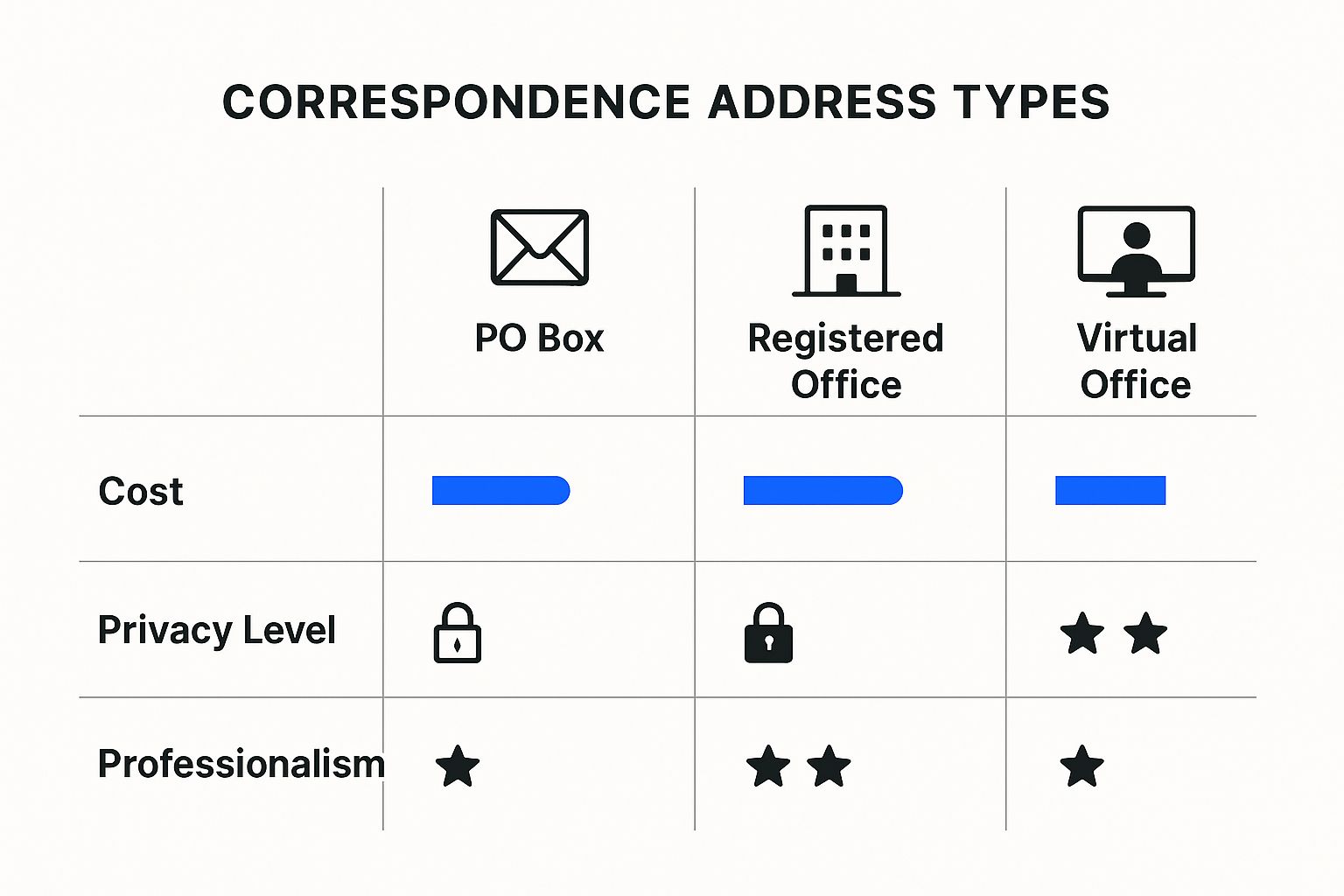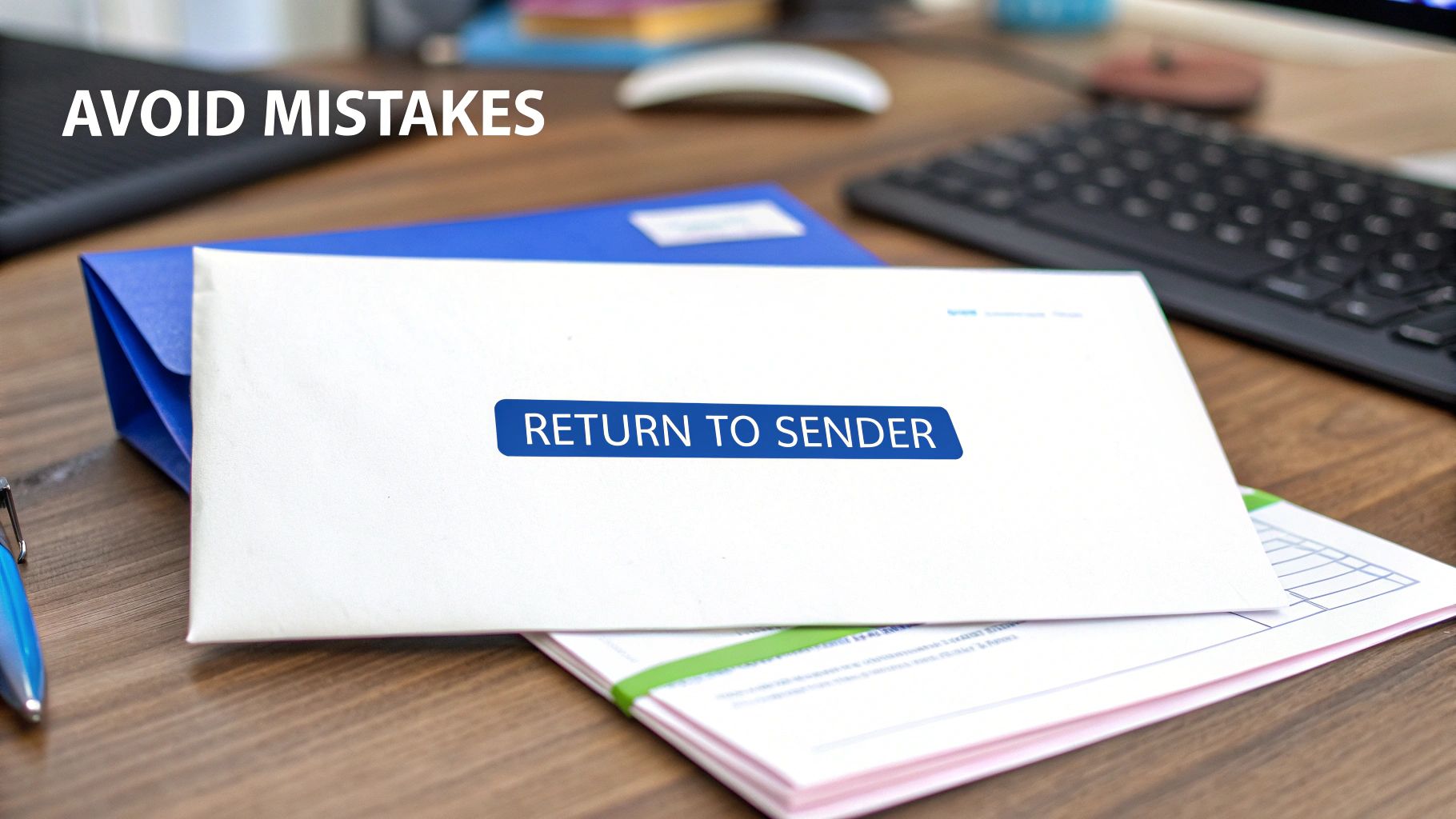Starting a business is a whirlwind of big ideas and crucial details. One of those small but mighty details is understanding the correspondence address definition. At its core, it’s simply the official address where your company receives mail from government bodies, banks, and other legal entities. Think of it as your business's dedicated, professional letterbox here in Hong Kong, ensuring you never miss a critical notice.
What a Correspondence Address Really Means for Your Business
Imagine your correspondence address as your company's single point of truth for high-stakes mail. This isn't just any old mailbox. It's the specific address where the Hong Kong government, your bank, and even the courts will send vital information directly to you.
Getting this wrong isn't an option. Picture this: a crucial tax deadline notice gets lost in the mail, or worse, a court summons never reaches you. The fallout could create massive headaches for your business. In short, this address is a cornerstone of your company's compliance and professional image.
Why It's a Legal Pillar
In Hong Kong, a correspondence address is a legally recognized point of contact, kept distinct from your home address or even your company's registered address. The golden rule? It must be a physical location within the city—a requirement designed to ensure official documents can always be served reliably.
This legal distinction became especially important after the new Companies Ordinance was introduced back in March 2014. The ordinance was a game-changer, designed to boost corporate transparency while also protecting the private information of business owners.
This regulation is a huge win for entrepreneurs. It gives you a legal way to keep your home address off the public record, allowing you to present a professional, compliant, public-facing address for your business instead. You can dig into the specifics of these protective measures on the Companies Registry website.
Essentially, your correspondence address boils down to three key functions:
- Compliance: It fulfils your legal duty to maintain a reachable address for official notices.
- Professionalism: It projects a credible business image to clients, partners, and financial institutions.
- Privacy: It creates a clear boundary between your personal life and your business, keeping your home address private.
Navigating the Legal Rules for Your Correspondence Address

Diving into the legal fine print doesn't have to be intimidating. The rules for a correspondence address, primarily governed by Hong Kong's Companies Ordinance, exist for one practical reason: to make sure the government and other official bodies have a reliable way to get in touch with your business.
It’s all about accountability. This isn't just bureaucratic red tape; it’s about establishing a dependable channel for official communication. When a tax notice or a court summons goes out, there needs to be a solid guarantee that it can be physically delivered and received. This fundamental need underpins all the requirements you'll need to follow.
The Must-Haves for Compliance
The law is crystal clear on a couple of points that often catch new entrepreneurs off guard.
First and foremost, your correspondence address must be a physical location within Hong Kong. This is a non-negotiable rule designed to keep all official business matters firmly rooted within the jurisdiction.
Because of this physical delivery requirement, a P.O. Box is strictly off-limits. It’s a simple logistical hurdle—an officer might need to serve documents in person, and you can't do that at a post office box. This is a critical part of the correspondence address definition you can't afford to overlook.
The core purpose here is simple: traceability. By mandating a real, physical address, the Companies Registry ensures that every registered business has a tangible footprint, preventing companies from simply vanishing without a trace.
This legal framework actually creates a huge advantage for you as a business owner. It provides a clear line between your professional and personal life. Using a compliant correspondence address means your home address stays private and off public records, helping you maintain that separation while projecting a more established corporate image.
Lastly, you have an ongoing responsibility to keep this information current. If your correspondence address changes, you must notify the Companies Registry immediately. Failing to do so can lead to missed legal notices and serious compliance headaches. To get the full picture on all legal requirements, take a look at our complete guide to company registration in Hong Kong.
Correspondence Address vs. Registered Office Address: What's the Difference?
It's easy to get these two terms mixed up, but in the eyes of Hong Kong law, they serve very different and equally important roles. Getting them right from the start is a simple step that saves a lot of headaches down the road. Let's clear up the confusion once and for all.
Think of your registered office address as your company's official, legal home base. This is the address that goes on public record with the Companies Registry, and it's where formal legal notices or statutory mail will be sent. Critically, this has to be a physical, local address right here in Hong Kong—a P.O. Box won't cut it.
Your correspondence address, on the other hand, is your company's everyday mailbox. It’s the practical address where you want to receive general mail from banks, government bodies like the Inland Revenue Department, clients, and suppliers. The two addresses can be the same, but they absolutely don't have to be.
Strategic Flexibility for Modern Businesses
This separation is a huge advantage, giving your business incredible operational flexibility.
For instance, a startup founder I worked with used their company secretary's professional address as their registered office. This move ticked all the compliance boxes and ensured critical legal documents were handled by a professional from day one. At the same time, they set their trendy co-working space as the correspondence address. This was where the team actually worked, and where daily packages and letters needed to go. Simple, right?
This two-address system lets you maintain a stable, professional legal front while directing your day-to-day business mail to wherever is most convenient. Making the right choice really comes down to your priorities, whether that's cost, privacy, or the corporate image you want to build. For a deeper dive into these foundational decisions, our guide on incorporating a company in Hong Kong is a fantastic resource.
The infographic below breaks down how different address types stack up against each other.

As you can see, a simple P.O. Box might be cheap, but it just doesn't work for legal compliance or projecting a professional image. A virtual office, however, often hits that sweet spot, balancing all three crucial factors.
Correspondence vs. Registered Office: Key Differences
To make it even clearer, here’s a quick table breaking down the distinct roles of a correspondence address versus a registered office in Hong Kong.
| Feature | Correspondence Address | Registered Office Address |
|---|---|---|
| Primary Purpose | Receiving general, day-to-day business mail (e.g., from banks, clients, IRD). | Official legal address for statutory records and formal government notices. |
| Legal Requirement | Optional but highly recommended for operational efficiency. | Mandatory for all Hong Kong incorporated companies. |
| Public Record | Not always required to be on the public record. | Yes, it is publicly available information at the Companies Registry. |
| Address Type | Can be a physical address, co-working space, or even a P.O. Box in some cases. | Must be a physical address in Hong Kong; P.O. boxes are not allowed. |
This table is your quick cheat sheet. Your registered office is about legal compliance, while your correspondence address is all about practical, day-to-day operations.
Making Your Correspondence Address Work for You

A correspondence address is more than just a box to tick on a form; it's a strategic asset. Think of it as your company's physical handshake. A well-chosen address in a prime business district can boost your company's image, making you look established and credible, even if your team is spread out across the globe.
This perceived professionalism can really open doors. When you’re trying to attract investors, court major clients, or even just open a corporate bank account, an address in a recognised commercial hub suggests stability and ambition. It’s a quiet but powerful way to build trust from the get-go.
More Than Just a Mailbox
Your correspondence address isn't just about your company—it plays a part in the bigger picture of Hong Kong's administrative framework. Government agencies rely on this data to collect vital statistics that influence public policy and economic forecasting.
Consider Hong Kong's Census and Statistics Department (C&SD). They have been using the correspondence address as a primary contact method for their General Household Survey since 1981. Having a stable, official address is critical for their follow-ups, ensuring the data they collect is accurate enough to shape the city's social and economic future.
This reliance shows that a correspondence address is far more than a simple legal requirement for your business. It's a fundamental piece of the city's governance. Once you've got your address sorted, the next challenge is managing the flow of documents. It's worth learning how to organize documents for effortless productivity to keep things running smoothly.
How to Choose the Right Correspondence Address
So, we've covered the what and the why. Now for the practical part: how do you pick the best correspondence address for your Hong Kong company? You have a few routes you can take, and each one offers a unique mix of cost, privacy, and professional polish.
Think of it this way: a freelance consultant working from home would likely benefit from a virtual office. It provides a proper business address and mail handling, which keeps their home life private while projecting a serious, corporate image to big clients. On the other hand, a small retail business with a physical shop can just use its storefront address for everything. It's simple, practical, and makes sense.
Ultimately, the right choice boils down to your specific business model, your budget, and where you see your company heading.
Evaluating Your Options
To figure out what's best, let's break down the pros and cons of the most common setups:
- Using Your Home Address: This is the cheapest way to go, but it comes with a major catch. Your personal address becomes public record, a huge privacy red flag for many founders. It can also look less professional to potential partners and customers.
- A Physical Office or Shop: If you're already leasing a commercial space, this is a no-brainer. It’s a straightforward, professional option that gives your business a tangible, physical presence.
- A Virtual Office: This is an incredibly popular choice for a reason. You get a prime business address in a great location without the eye-watering cost of a physical lease. It’s perfect for maintaining privacy, looking professional, and managing your mail from anywhere. For startups and online businesses, this flexibility is a game-changer. You can learn more about how to register a company at a virtual office address.
It's also worth noting that the Hong Kong government is actively working to ensure address data is accurate and reliable.
The Address Lookup Service (ALS), run by the Digital Policy Office, is a great example. Officially published since 2023, the ALS provides a database of premises' addresses that's updated every month. This ensures that official communications don't get lost in the shuffle—a crucial piece of infrastructure for the millions of letters sent across the city each year.
Choosing your correspondence address is one of those foundational business decisions. It says a lot about your company's identity and how you operate, so it's worth taking the time to pick the one that truly fits your vision.
Common Questions We Get About Correspondence Addresses
Even when the rules seem straightforward, real-world questions always come up during the company setup process. It’s one thing to know the correspondence address definition, but it's another thing entirely to apply it correctly. Let's walk through the most common queries we hear from entrepreneurs here in Hong Kong.
My aim here is to give you clear, practical answers so you can handle your obligations confidently and steer clear of simple, but potentially expensive, missteps.
Can I Just Use a P.O. Box?
The short answer is a hard no—at least not for your legally required registered address. Hong Kong's Companies Ordinance is crystal clear: your registered office must be a physical location. A Post Office Box just doesn't cut it.
The logic is practical. Government bodies need a reliable, physical place where they can hand-deliver legal documents if the situation calls for it. A P.O. Box can't guarantee that. If you're after privacy and a professional image, a virtual office service is a very popular—and completely legal—alternative.
Think of it this way: the government needs to know every company has a real-world footprint. A physical address creates a tangible point of contact that a P.O. Box, by its very design, simply can't provide.
What Happens If I Let My Address Get Out of Date?
Letting this slide is a serious gamble. The fallout can range from a major hassle to something far more severe. You could miss crucial legal notices from the court, tax reminders from the IRD, or other official communications.
When those documents don't reach you, it can quickly lead to hefty fines, late penalties, or even legal action against your company and its directors. In the worst-case scenario, the Companies Registry can actually strike your company off the register. Keeping your address valid isn't just a box-ticking exercise; it's a core responsibility of running a business in Hong Kong.
How Do I Change My Correspondence Address?
Changing your address isn't as simple as updating your website; it's a formal process. You have to notify the Companies Registry as soon as the change happens. This usually means filing a Form NR1, especially if you're updating both your registered and correspondence addresses at the same time.
You have a strict deadline for this: the form must be submitted within 15 days of the address change. Keeping your company’s information up-to-date is absolutely vital for staying in good standing and making sure important mail finds its way to you without any delays.
Ready to establish a professional and compliant presence in Hong Kong? Lion Business Consultancy Limited specialises in company formation and can provide you with a prestigious correspondence address that meets all legal requirements. Secure your Hong Kong business address with us today.


